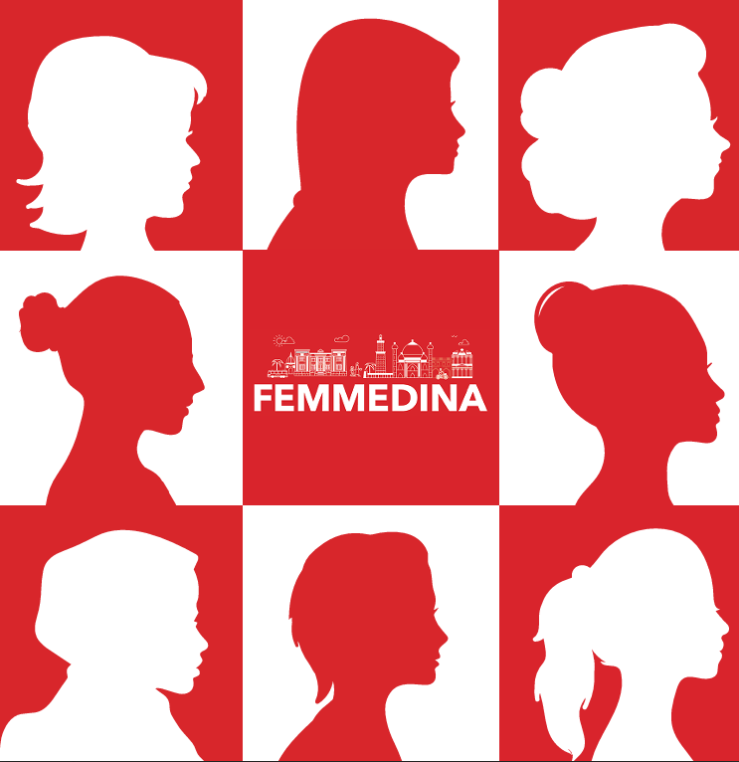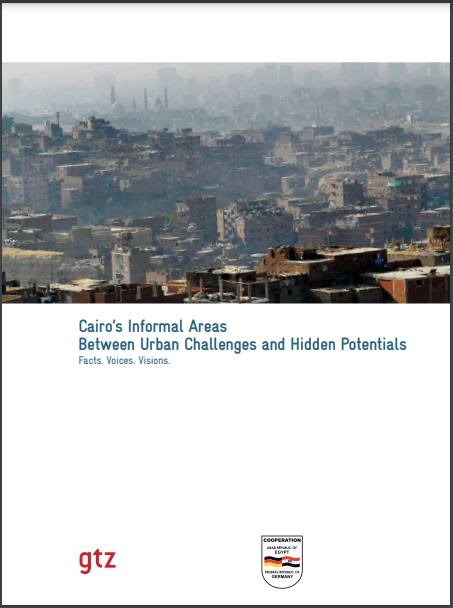Cities Alliance has been working in the Middle East and North Africa (MENA) region since 2000. The issues addressed through projects and grants over the past 20 years have included slum upgrading, urban planning, migration, gender equality, and environmental sustainability. Projects have been carried out in Morocco, Tunisia, Egypt, Jordan, Lebanon, Palestinian Territories, Iran, and Yemen. Since 2016, Cities Alliance has located its regional office in Tunis, Tunisia to deliver projects and technical assistance both at local and regional levels.
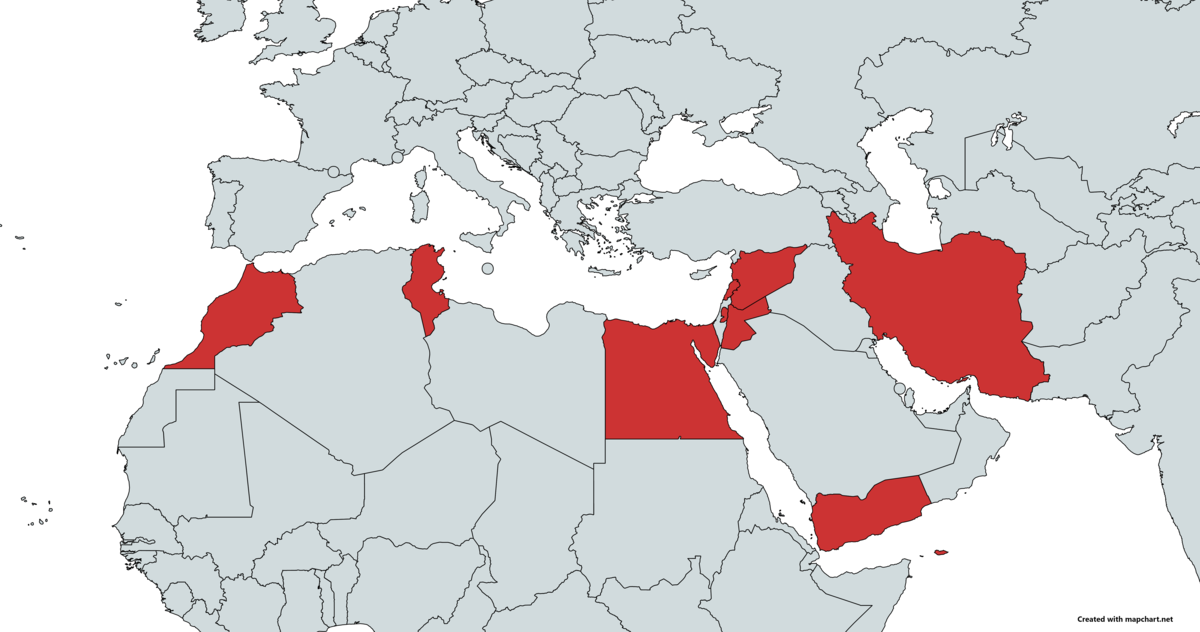
Cities Alliance (CA) has specific expertise in the region on:
- Participatory and inclusive gender-sensitive urban planning, and the development of City Development Strategies integrating the SDGs and their translation into local development plans as well as communal investment programs;
- Support to municipalities in the development and implementation of infrastructure projects while strengthening their project management and capacity to leverage additional funding.
Cities Alliance implements through:
- Technical assistance and capacity building to local and national governments in developing urban policies and projects through an inclusive process;
- Gender-sensitive procurement and direct project implementation;
- Mini-grants to civil society organizations to engage them in planning processes and implementation of urban projects.
The following portfolio includes some of the projects implemented by Cities Alliance and its partners in the MENA region:
Tunisia
Cities Alliance has been working in Tunisia since 2016, to strengthen the democratic process and decentralisation initiatives that were put in place in the country over recent years. By providing vital support to urban development and local governance, we help reinforce institutions and frameworks and encourage civil society participation to help Tunisian cities become engines of local democracy and development. To achieve these objectives, Cities Alliance in Tunisia works at the national, city, and community levels. Our initiatives focus on five key areas:
1. Decentralisation and national urban frameworks
2. City planning for inclusive and sustainable development
3. Partnerships for innovative municipal financing
4. Climate-resilient and gender-sensitive infrastructure
5. Economic development and inclusion in lagging cities
Cities Alliance is implementing the Femmedina Inclusive City Programme, a gender-focused project that aims to rehabilitate and activate the public spaces in the historic centre of Tunisian cities, the Medina, through a broader process of women’s participation.
The project is called Femmedina, a combination of the terms “femmes (women)" and “medina” (historical city), because cities have a key role to play in promoting gender equality and empowering women and girls. Public spaces can bring together communities and facilitate cultural expression and diversity, so it is important to look at how public spaces can promote women-city relationship building.
See the video of the initiative its pilot project in Tunis here.
The second phase of the Madinatouna project (2020-23) supports four partner cities (Béja, Jendouba, Médenine and Tataouine) in adopting strategic planning tools for their territories and implementing the projects identified and prioritised through the CDS process.
It also aims to create a framework for consultation at the national, regional and local levels to facilitate the implementation of the decentralisation process in Tunisia.
Activities include:
- Elaborating Local Development Plans (LDP) based on the city development strategies developed during Phase I.
- Strengthening cities' capacity to prioritise investment projects using a participatory approach and elaborate local development plans through planning tools that integrate sustainable and inclusive development.
- Elaborating and implementing projects identified through the CDS and LDPs, including financing medium-term infrastructure projects and searching for external funding sources.
- Supporting the decentralisation process by harmonising, disseminating, and institutionalising the planning tools developed under the programme.
The Madinatouna II activity is funded by the Swiss State Secretariat for Economic Affairs (SECO).
Funded by the Ministry of Europe and Foreign Affairs of France, the Women and Sustainable Cities programme (Femmes et Villes Durables) aims to strengthen women's leadership in the decision-making and management of scarce urban water resources in the MENA region. Launched in May 2023, the 2.5-year pilot is implemented in collaboration with local governments and local civil society organizations in Figuig (Morocco), Kairouan (Tunisia), and Sebkha (Mauritania).
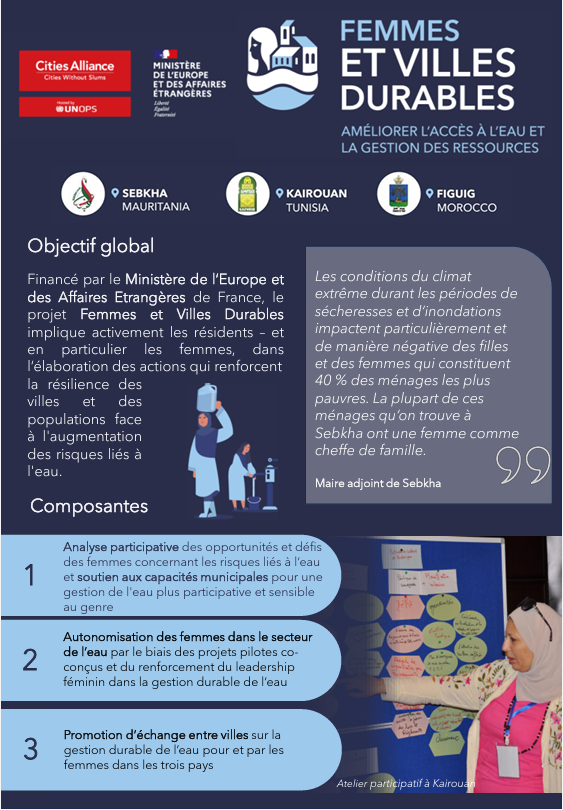
The project "Improving gender-mainstreaming within local public policies" in the cities of Béja and Médenine, led by the Aswat Nissa in partnership with Cities Alliance and Heinrich-Böll Stiftung, aimed to reduce gender inequalities in a Tunisian context marked by decentralization of powers. The project included the production of policy briefs, gender-sensitive budget analysis, and training sessions in the two municipalities.
In Kairouan, a women-run artisanal market with ten large, attractive stalls is up and running. The project’s secondary activity on designing tourism circuits, with a direct cost of US $10,000, has already leveraged US $140,000 in public funding for implementation. The National Office for Tourism decided to fully develop the identified tourism circuits in the three communes of Ain Jeloula, Haffouz, and Oueslatia as part of a new government programme.
This project promotes inter-municipal collaboration between neighbouring cities in critical areas such as service provision, in the context of decentralisation reforms. Three partners – GIZ, SKL International, and UNDP – are working closely with the FNVT and the Ministry of Local Affairs and Environment to operationalise the project.
Three pilot projects have pioneered inter-municipal cooperation between 12 municipalities that have put mechanisms in place to jointly make local governance, public management, and municipal service delivery more sustainable and efficient.
These joint projects addressed green waste collection and environmental protection initiatives that are anchored in newly created planning units. They include:
- A new green waste composting facility established in northern Tunis, following a feasibility study and conceptualisation of the composting site.
- On the island of Djerba, a new Intermunicipal Planning and Monitoring Unit will formalise current short-term inter-municipal practices in the medium- to long-term and strengthen the strategic planning capacities of Djerba’s three main municipalities (Ajim, Houmt El Souk, and Midoun) for integrated development of the island. The municipalities have also developed a joint parking plan to improve access and traffic on Djerba.
- The seven partnering municipalities of Tunis-South have jointly developed a campaign for containing insects to improve public health.
The project has also produced a diagnostic study and best-practice guide on inter-municipal cooperation that provides practical guidance to national and local authorities on implementing inter-municipal initiatives and technical advice to stimulate increased collaboration between secondary cities. The production process brought national and local authorities together to jointly reflect and exchange on common challenges and foster coordination across government levels – an emerging concept in Tunisia.
Multi-stakeholder discussions on lessons learned, value, and challenges are informing the national debate on how to operationalise inter-municipal cooperation. The guide’s recommendations are also contributing to operationalising the provisions governing inter-municipal cooperation in the Local Government Code.
The project is implemented by UNDP.
Cities Alliance, in partnership with UN-Habitat, is supporting the Tunisian government to formulate a National Urban Policy (NUP) that aims to provide a unified urban development framework to manage urban spread efficiently and coherently at the regional, national, and local levels.
The project has brought stakeholders together for consultations to gather the necessary political support to develop a joint vision for the future development of Tunisian cities. The Steering Committee has produced a road map for developing the NUP, and UN-Habitat has completed a stakeholder mapping exercise and the initial strategic outline of a policy.
To make the NUP sustainable, inclusive, and based on an analysis of cross-cutting realities, UN-Habitat prepared regional dialogues across the country. These dialogues were instrumental in helping to collectively identify urban development priorities and challenges and set future development goals. They also provided guidelines for improved articulation between urban planning and the provision of public infrastructures and services and how to optimise the value of local, national, and regional investments.
From 2016-20, the Country Programme supported eight mainly inland secondary cities to adapt to decentralisation. The cities were Béja, Gabès, Jendouba, Kairouan, Medenine, M’saken, Sidi Bouzid and Tataouine. A ninth city, La Soukra, used its own resources to participate in the programme.
Through the Madinatouna strategic city planning initiative led by UNDP and implemented by the National Federation of Tunisian Cities (FNVT), all nine cities produced city development strategies to serve as roadmaps for long-term development planning. Local officials developed an understanding of the importance of strategic planning for their cities, and municipal technical teams were trained in participatory planning approaches.
The CDS process strengthened the nine cities’ approaches to urban management, strategic planning, and service delivery. It has helped them better identify priorities and use a strategic planning process that aligns urban planning with the provision of public services.
The Madinatouna initiative was funded by the Swiss State Secretariat for Economic Affairs (SECO).
The World Bank produced a study that systematically identifies and analyses development constraints and opportunities for improving outcomes for residents of Tunisia’s lagging regions.
The study also addresses reducing regional disparities by focusing on the role of cities and local economic development. Undertaken in support of the Ministry of Investment, Development and International Cooperation, the World Bank assisted in closing knowledge gaps and informing and prioritising key investments, policies, and programmes for future interventions.
To this end, “deep-dive” analyses of three Tunisian lagging governorates (Kasserine, Le Kef, and Tataouine) were undertaken and concrete recommendations were formulated. The economic potential analyses and the policy note suggest the following three priority areas for national government action:
- Strengthening the institutional environment by operationalising the Local Government Code;
- Enhancing economic connectivity, such as through the promotion of development corridors across administrative boundaries (inter-municipal cooperation); and
- Improving conditions in specific lagging areas through targeted interventions that leverage each region’s differentiated territorial assets, such as promoting the key economic sectors identified in the respective region.
The innovative tools developed by the World Bank based on the study have reinforced the skills of the Ministry of Development, Investment and International Cooperation (MDICI) in territorial development planning in disadvantaged regions. They have also helped the MCICI prioritise public investments in a more targeted manner so that they have a greater impact on the development of the regions.
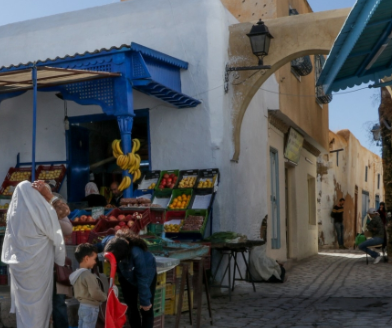
In 2007, the seven municipalities part of Greater Sfax approached the Cities Alliance for support in operationalising and implementing the already developed Greater Sfax Development Strategy (GSDS). The Cities Alliance supported a series of diagnostic studies to assess the extent of the problems facing Greater Sfax. Specifically, the studies focused on local economic development, underserved neighbourhoods, employment, and mass transport. An urban observatory was established to gather, analyse and disseminate city data. Based on extensive surveys spanning a two-year period, a typology of underserved neighbourhoods was also identified. These
efforts eventually contributed to the identification of a setof priority projects for the Greater Sfax area.
Lebanon
Cities Alliance has worked in Lebanon since 2006 with different partners. The main themes on which the organization has focused have been urban inclusion and socio-economic development, especially investigating the impact of migrants on cities after the Syrian refugee crisis.
Key focus areas:
- Migration impact city profiling
-
City planning for inclusive and sustainable development
-
Economic development and inclusion in lagging cities
This project seeks to inform humanitarian, local authority and governmental actors and urge them to mainstream inclusive interventions in Lebanon. The project is unique in Lebanon because while many within the humanitarian community are focusing on the needs of refugees, very few stakeholders plan and coordinate activities with local governments – leaving the emerging crisis of unplanned urban expansion in Lebanon unaddressed.
It will produce a sound knowledge base in the four cities of Beirut, Tripoli, Tyre, and Saida – which have been the most affected by the refugee crisis – by using city-profiling as an analytical tool to assist local governments in decision making.
In addition, a State of Lebanese Cities report will provide a sound basis for humanitarian actors to better coordinate assistance with local governments for a long-term development perspective, and provide valuable analysis for the government and other stakeholders to formulate and prioritise their development frameworks.
The project is implemented by UN-Habitat and sponsored by the Ford Foundation and United Cities and Local Governments Middle East and West Asia Section (UCLG-MEWA).
Since the start of the Syrian crisis in 2011, Lebanon has experienced an influx of more than 1.2 million Syrian refugees – making it host to the world’s highest concentration of refugees compared to residents. This migration has had significant implications for Lebanon’s cities, especially on the demographic, economic, security and political levels. Limited data on the location of refugees within cities has made it difficult to formulate a coherent response to the crisis.
Despite its role as a major host to refugee populations, Lebanon has not signed the 1951 Convention relating to the Status of Refugees or its 1967 Protocol, which are the core instruments outlining minimum standards for the treatment of refugees and asylum seekers. Without this framework outlining roles and responsibilities, Lebanon largely has relied on the Lebanese and International NGOs, with the support of the relevant UN agencies (UNHCR, UNRWA) to respond to the refugees’ needs.
Working from previous experiences in local authority training and collaboration, the project seeked to understand the role of local authorities in the global refugee protection regime, using the Right to the City (R2C) framework and the current movement behind the Global Platform on the Right to the City.
It aimed to develop a framework for local authority protection of refugee communities; participatory consultation mechanisms; protection policies and services; and an understanding of the roles and rights of the refugee community. The project facilitated refugee communities’ interaction with the local community and local authorities to create stronger social inclusion within the community and better provisions for protection. It also focused on promoting specific measures that protect refugee women and children, who are often engaged in precarious work and/or are more vulnerable when basic rights and services are not met.
The activity was sponsored UCLG and is implemented by the Housing and Land Rights Network – Habitat International Coalition.
The project was implemented by the three cities of Tripoli, El Mina and Beddawy, comprising the Al Fayhaa Union of Municipalities with support from Cities Alliance. The main aim was the production of a local economic development strategy and investment plan for urban renewal and environmental management.
The project included the conduction of a consultative process with stakeholders. The development of multiple assessments, including a competitiveness assessment, an environmental assessment, as well as an urban poverty assessment. The assessments were followed by the development of a local economic development strategy, an urban upgrading strategy, as well as a capacity building and training programme.
Jordan
Cities Alliance has worked in Jordan since 2004, with the design of the Greater Amman City Development Strategy. The key focus areas for the country are:
- City planning for inclusive and sustainable development
-
Climate-resilient and gender-sensitive infrastructure
-
Inclusive public spaces and historical heritage sites
The project implemented by the World Bank and the Ministry of Municipal Affairs of Jordan, in partnership with Cities Alliance aimed to reach the following objectives.
- Support local economic development through an inclusive and participatory process in their respective city-regions (north, center and south) which have significant pockets of poverty.
- Build the capacity of the Greater Amman Municipality (GAM) to support and guide the CDS process in these cities based on its gained experience in areas such as urban planning, governance, financial management and local tax administration, among others.
- Enhance the competitive advantage of the cities of Mafraq, Karak, Zarqa and Tafilah by improving employment opportunities for vulnerable groups (youth, migrants) through better socio-economic integration of municipalities and their resources, and by increasing investment opportunities for the private sector.
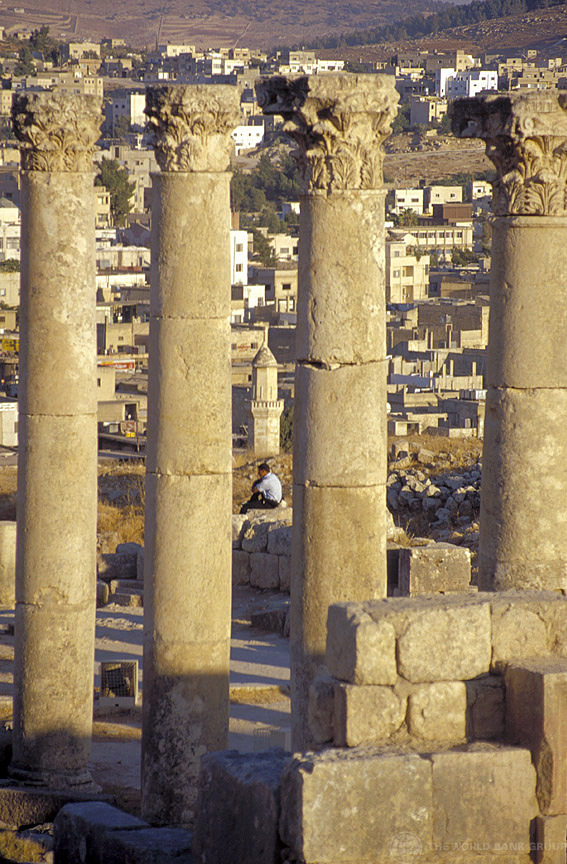
The project implemented by the World Bank in partnership with Cities Alliance aimed to improve the mechanisms of urban governance in Greater Amman; enhance the performance of the municipal urban development department in initiating urban upgrading of squatter settlements, updating the Amman Master Plan, as well as in improving the documentation of urban land use and data; and to adopt city-wide upgrading of squatter settlements and refugee camps, building on the successful experience of upgrading four settlements.

Egypt
Cities Alliance has worked in Egypt since 2001, together with different partners at the city and national level. The key focus areas of the initiatives implemented are:
- City planning for inclusive and sustainable development
- Slum-upgrading and improved access to services
- Waste management
With support from the Cities Alliance through a grant from the Bill & Melinda Gates Foundation, GIZ has been implementing a package of projects designed to improve livelihoods for the large number of informal waste collectors in Greater Cairo, whose livelihoods were threatened by privatisation of the industry. Despite the extensive political unrest and upheaval in Egypt since the implementation of the project, a number of results were achieved in 2014, including:
• Development of comprehensive solid waste management (SWM) strategies for the cities of Khosoos and Khanka. The city-level strategies were formulated through a consultative process with all stakeholders, including local city councils, NGOs, private companies and communities. The Governor of Qalyubeya and both city councils 28 endorsed the strategies, and implementation plans were detailed for projects outlined by the community plans.
• Increased community awareness of solid waste management problems and respective roles and responsibilities. Seven community committees were established to monitor the efficiency of the services provided in their respective locations, and then take part in implementing community initiatives. The community groups helped organise ten environmental campaigns with the active participation of more than 1,000 citizens in the cities of Khosoos and Khanka.
• Development of the capacity of local administration, NGOs and informal operators on sustainable and environmentally sound methods of SWM. Two SWM units were established in Khosoos and Khanka to undertake planning, information management and monitoring, and evaluation of private companies contracted by the city council. The units were fully equipped, with staff allocated and extensively trained. The activity also included the development of a comprehensive database of SWM information that is continuously updated.
• Enhancement of the institutional and administrative capacities through training. Training was provided for all stakeholders in SWM in Khosoos and Khanka, including the SWM units, NGOs, youth, community committees, and private operators. Unit staff were trained in how to monitor the performance of waste operators by tracking waste collection. They in turn provided continuous on-the-job training on downloading, matching and geo-referencing Google maps and satellites.
• Improved living and working conditions for informal waste operators. The project assisted in establishing the “Friends of the Environment” NGO by informal waste collectors in the city of Khosoos to facilitate their integration in the waste sector. The project also successfully executed five complementary small-scale initiatives to address priorities identified by the community, including an income-generation initiative that helped 70 women start their own micro businesses in the field of sorting and recycling waste. The initiative was implemented jointly with two local NGOs.
• Establishment of recycling structures for processing waste. A centre was built in the city of Khanka for the supply, installation and commissioning of sorting, as well as composting. The facility is also intended to provide the informal sector with direct and indirect working opportunities. In addition, a transfer station was built in Khosoos to limit the distances travelled by collection vehicles, reduce illegal dumping on the outskirts of the city, and achieve better monitoring of waste. The transfer of 29 stations also supports the income of private operators from the informal operators' group by reducing their transfer and disposal costs to the landfill.
The project was implemented by the Hands Along the Nile Development Services, Inc. with support from Cities Alliance. The main objectives of the project were:
• Integrate informal waste collectors in Cairo into the formal city collection system;
• Improve the capacity of the Zabaleen communities to organize and represent their own interests;
• Raising the ability of the Zabaleen community to engage in successful recycling business activities, particularly through SMEs and NGOs;
• Achieve a city-wide awareness campaign targeting the inhabitants and business organizations of Cairo on the importance of Source Segregation of Household Waste into two streams: organic and non-organic;
• Move recycling businesses to new industrial zones.
The overall objective of the Alexandria City Development project was to assist Alexandria Governorate to complete its City Development Strategic Framework for sustainable development and prepare for its implementation technically and institutionally. The specific objectives included: i) Institution building for effective implementation of CDS ii) Local economic development related activities iii) City-wide participatory urban upgrading of squatter settlements iv) Environmental rehabilitation of Lake Marriout and development of the surrounding area.
UN-HABITAT. In 1999, the governor of Ismailia approached the Cities Alliance, with support from UN-HABITAT, for assistance with planning and designing the upgrading of two informal areas surrounding Ismailia’s Lake Timsah: El Hallous and El Bahtini. This activity was largely driven by the governorate with the support of local counterparts from the Sustainable Ismailia Governorate Project. Its success was due in large part to the fact that the project allowed for continuity and incorporated local knowledge accumulated from lessons learned in the past. The Cities Alliance activity has helped consolidate the governorate’s upgrading strategy. For the communities, the participatory process has given them a role and a voice in the upgrading programme. Possibly the biggest impact of the upgrading on the families affected will be secure tenure. The impact of this security is already observable in the large amount of house consolidation that is currently underway in the two communities. The governor, convinced by the results of the preparatory work, moved quickly to start the upgrading. He took the matter to the Ministry of Planning and was instrumental in securing a budgetary allocation in the first National Five-Year Plan. The governor has indicated his priorities by establishing the High-Level Committee for Slum Upgrading, with a clear emphasis on participatory processes, which are flourishing in Ismailia. As a result of these activities, the governorate and the UNDP have initiated a participatory approach for the physical and social upgrading of the two settlements in 2003–05. The Italian government has facilitated a debt swap that will leverage about US$3.5 million to support the upgrading process in the two neighbourhoods. The success of the Ismailia project has contributed to raising the profile of upgrading on the government’s agenda, while the governorate has signalled its intent to upgrade all informal settlements within its jurisdiction.
Morocco
Cities Alliance has been working in Morocco since 2001, both at the national and city level. The key focus areas of the implemented initiatives are:
- City planning for inclusive and sustainable development
- Slum-upgrading and improved access to urban services
The project 'Metropolitan Cooperation in the Tetouan region: The Role of CDS' was implemented between 2003 and 2009 in partnership with USAID, UN-HABITAT, the International Network for Urban Development, the Arab Media Forum for Environment and Development, the Near East and North Africa Region (NENA) Urban Forum, and the Morocco Urban Forum.
The main results of the project were:
- the engagement and creation of a dialogue between public and private stakeholders;
- the improvement of knowledge and data of the territory;
- the capacity-building of local and regional authorities;
- the guidance for new urban projects in the area;
- the promotion of CDSs as an approach to participatory planning in the region.
The Framework Agreement set the foundations for a Cities Alliance partnership with Morocco’s Ministry of Housing and Urban Development for the support and monitoring of the Government’s national Cities Without Slums Programme which aims to gradually upgrade slums (200,000 households by 2010), taking the city as the programming unit, within a contractual framework between the State and local authorities.
The main activities implemented were:
The draft of a comprehensive technical assistance and training plan;
The creation of a Slum Observatory, and establishment of a Technical Monitoring Committee to ensure coordination and follow-up of programme implementation;
The support to local stakeholders and intersectoral development structures, including support for the creation of a ‘Cities Without Slums’ agency within the Directorate for Low-Income Housing and Real Estate;
The use of information professionals and the media to design an Information and Communication Plan to share lessons of Morocco’s CWSP experience with other countries.
The project implemented by Cities Alliance in partnership with the Tetouan Urban Agency, aimed to create the master plan and investment plan for regularization and upgrading of the informal settlement Korrat Sbaa through extensive participation and capacity building of neighborhood associations, using experience from Barcelona and Rio de Janeiro.
Drawing lessons through a participatory process (interviews, evaluation workshop) and taking into account other relevant examples in Morocco (Sale, Tangiers), with the support of co-implementing agencies (municipalities of Tetouan and Barcelona), a methodological framework was prepared to systematically include participatory components in the Korrat Sbaa urban rehabilitation project from initial steps.
Funded by the Ministry of Europe and Foreign Affairs of France, the Women and Sustainable Cities programme (Femmes et Villes Durables) aims to strengthen women's leadership in the decision-making and management of scarce urban water resources in the MENA region. Launched in May 2023, the 2.5-year pilot is implemented in collaboration with local governments and local civil society organizations in Figuig (Morocco), Kairouan (Tunisia), and Sebkha (Mauritania).

Syria
The project was implemented by GIZ and the City of Aleppo in partnership with Cities Alliance. It aimed at revising the previous Aleppo Master plan adopted in 2002 and the City Council priorities adopted in 2003. A city development strategy was prepared to understand and address the feasibility criteria, funding constraints, and the reform agenda in accordance with the five-year national plan. The strategy focused on key concerns related to poverty, income, and employment, as well as the quality of life concerns in five key areas: local economic development, urban service delivery, the urban environment, urban spatial efficiency, and administrative and financial modernization.
Iran
Cities Alliance in partnership with the World Bank facilitated the development of a national dialogue on city-wide slum upgrading with the following objectives:
- To support a national policy debate on citywide slum upgrading;
- To expose policymakers to international examples of citywide and nationwide approaches to slum upgrading;
-To identify a range of policy options for Iran;
- To strengthen collaboration between different tiers of government and agencies dealing with urban upgrading.

Palestine
Cities Alliance has worked in Palestine since 2005 in partnership with national and local actors.
The key focus areas for implemented initiatives are:
- City planning for inclusive and sustainable development
- Slum-upgrading and improved access to services
-
Economic development and inclusion in lagging cities
When a separation wall was constructed in 2002, residents of four East Jerusalem neighbourhoods became isolated between the wall and the city boundaries. Since then, they have been neglected by the municipality of Jerusalem, resulting in growing informality, lack of basic services, reliable data, and political representation. This project aimed to mobilise and train those communities to develop an urban database that would bridge the data gap and work as an advocacy tool to engage decision-makers and donors to improve quality of life. Data collected was used to produce assessment reports, maps, atlas, and an online platform, which are public and present the collected information separately for each neighbourhood. The project has successfully provided accurate and transparent information that highlights the urgent needs of the population and will help them advocate for better provision of social and physical infrastructure. It also mobilised and empowered the targeted communities with reliable data and tools.
The project faced many challenges, such as the complexity of the political situation, which diminished dwellers´ participation, affecting the data collection and making the process time-consuming. Another challenge was the low capacity of staff and the absence of an efficient archiving system in the local councils of the targeted areas.
The most relevant lessons learned relate to community engagement and mobilization. This is a lengthy process, which requires time for community trust, and should be linked to tangible incentives. Other lessons learned were the importance of involving key governmental stakeholders, which gives a sense of seriousness and encourages commitment; the need to build the capacity of implementing partners and to translate the collected data into simple infographics, which helped the communities understand the project’s results; and finally, the understanding that working in complex political contexts requires some flexibility and ability to modify the original work plan according to the changing circumstances
The Palestinian Territories have been witnessing major social, economic, and environmental challenges in addition to the constraints imposed by the political context. These challenges -- increased urbanization levels, high unemployment rates, limited control over natural resources and land, and severe transport and movement restrictions -- impact the daily lives of Palestinians. As most of these challenges are faced at the local level, it is necessary to make the local government units (LGUs) key actors in addressing these issues/challenges since they are the closest to the population and directly accountable to their citizens. This proposed cooperation project focused on scaling-up and linking locally prepared "Strategic Development and Investment Planning for Palestinian Cities and Towns (SDIPs)", financed by the Municipal Development Programme, to a systematic support structure at the national level. (The SDIP is a participatory development planning process and instrument that intended to steer local development using an integrated, multi-themed and multi-stakeholder approach.)
Yemen
Cities Alliance has worked in Yemen since 2002.
The key focus areas for implemented initiatives are:
- City planning for inclusive and sustainable development
- Partnerships for municipal financing
-
Economic development and inclusion in lagging cities
City development strategies (CDS) were carried out in four of Yemen’s largest urban areas – Sana’a, Aden, Mukalla, and Hodeidah. With support from Cities Alliance and The World Bank, the CDS process in each of these cities brought together public and private sector leadership to assess the strengths and weaknesses of the city, think strategically about opportunities for equitable economic growth, develop a long-term vision, and draft a prioritized action plan. In all four cases, the CDS process was coupled with revisions to the cities’ master plans to ensure a strong link between economic development plans and infrastructure.
Creating a long-term vision for the city required the participation of a variety of public, private, and civil society leaders who did not often have the occasion to come together to discuss the challenges and opportunities facing the city. The structure for cross-sectoral communication provided under the umbrella of the CDS had a lasting effect in terms of helping to align the city’s social, economic, and environmental interests. In addition, with the financial support under the CDS, local leaders had access to much-needed technical support and expertise focused on issues of local concern.
The project aimed to develop a long-term strategic framework for the sustainable development of Sana’a. The municipality of Sana’a seeked to reinforce its capacity in urban planning and management, through strengthening the institutional setup and improving the capacity of municipal staff for local economic development, integrated upgrading, and provision of infrastructure and service delivery.
The objectives of the project were:
- The development of a medium- to long-term strategy for local economic development and strengthening management of municipal finance;
- the development of an integrated upgrading strategy for squatter/informal settlements;
- the development of a strategy to improve Sana’a municipality’s capacity in urban planning, infrastructure, municipal service delivery and management, and land management, and implementation of LED and environmental improvement programmes.


